简单句及并列句翻译及练习
英语五种简单句型及例句及翻译

英语五种简单句型及例句及翻译
一、主+谓
•例句:
–I study.
–She sings.
–He runs.
•翻译:
–我学习。
–她唱歌。
–他跑步。
二、主+谓+宾
•例句:
–Mary reads a book.
–Peter drinks water.
–They play football.
•翻译:
–玛丽读书。
–彼得喝水。
–他们踢足球。
三、主+谓+宾+宾补
•例句:
–She painted the wall red.
–They elected John president.
–He considers the idea impossible.
•翻译:
–她把墙刷成了红色。
–他们选举约翰为总统。
–他认为这个想法是不可能的。
四、主+系+表
•例句:
–She is a doctor.
–He was happy.
–They will be late.
•翻译:
–她是一名医生。
–他很高兴。
–他们会迟到。
五、主+谓+间宾+直宾
•例句:
–John gives Mary a present.
–She told me a story.
–They show us the way.
•翻译:
–约翰给了玛丽一个礼物。
–她告诉了我一个故事。
–他们向我们指出了方向。
希望以上简单句型及例句的分析能够帮助您更好地理解英语语法。
让我们一起努力学习,提高英语水平!。
英语:简单句和并列句

1) Light travels faster than sound.
光比声传播速度快。(说明事实)
2) The film is rather boring.
这部电影很乏味。(说明看法)
要特别注意陈述句的否定结构
首先,否定转移:主句谓语动词是think, expect, believe, suppose, guess 等表“认为” 的动词时,宾语 从句的否定习惯上前移到主句谓语上. 例如:1) I don’t think I know you. 2) She doesn’t believe you are wrong. 注意: hope 不在此列. 误: I don’t hope it will rain. 正: I hope it won’t rain.
4)主 + 动 + 宾 + 补 例如: Time would prove me right. 时间会证明我是对的。 5)主 + 动 + 间宾 + 直宾 例如: My mother made me a new dress.
我母亲给我做了一件新衣裳。
IV. 并列句的常用连词
1. 我们常用并列连词and, not only…but also…等
与系动词连用,一起构成谓语,说明主语的性质特征等。 常由名词、代词、形容词、数词、短语或从句等充当。 英语中常见的连系动词有: look; sound; feel; seem等。
例如:
1. Her grandfather is an engineer. 2. The two countries were at war then. 3. The fact seems that he didn’t notice the car.
高考英语复习句子分类之简单句,并列句和复合句知识点
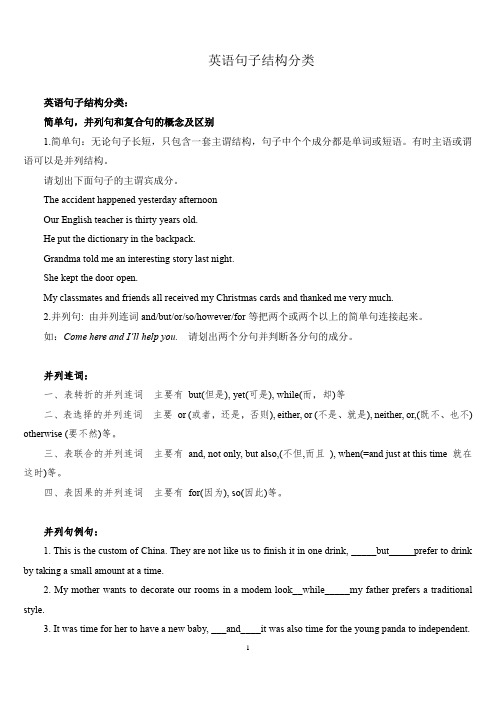
英语句子结构分类英语句子结构分类:简单句,并列句和复合句的概念及区别1.简单句:无论句子长短,只包含一套主谓结构,句子中个个成分都是单词或短语。
有时主语或谓语可以是并列结构。
请划出下面句子的主谓宾成分。
The accident happened yesterday afternoonOur English teacher is thirty years old.He put the dictionary in the backpack.Grandma told me an interesting story last night.She kept the door open.My classmates and friends all received my Christmas cards and thanked me very much.2.并列句: 由并列连词and/but/or/so/however/for等把两个或两个以上的简单句连接起来。
如:Come here and I’ll help you. 请划出两个分句并判断各分句的成分。
并列连词:一、表转折的并列连词主要有but(但是), yet(可是), while(而,却)等二、表选择的并列连词主要or (或者,还是,否则), either, or (不是、就是), neither, or,(既不、也不) otherwise (要不然)等。
三、表联合的并列连词主要有and, not only, but also,(不但,而且), when(=and just at this time 就在这时)等。
四、表因果的并列连词主要有for(因为), so(因此)等。
并列句例句:1. This is the custom of China. They are not like us to finish it in one drink, _____but_____prefer to drink by taking a small amount at a time.2. My mother wants to decorate our rooms in a modem look__while_____my father prefers a traditional style.3. It was time for her to have a new baby, ___and____it was also time for the young panda to independent.4. He is a shy man,__but/yet_______he is not afraid of anything or anyone. 解析:But/yet转折连词。
简单句的基本句型讲解(附练习题+答案)

简单句的基本句型讲解(附练习题+答案)简单句:由一个主语(或并列主语)和一个谓语(或并列谓语)所构成的句子。
简单句分为5种基本句型:1.主语+谓语(主语+不及物动词)例1:My little sister can swim very well. 我妹妹游泳游得很好。
主语谓语(不及物动词)例2:The planehas already arrived. 飞机已经抵达。
主语谓语2.主语+谓语+宾语(主语+及物动词+宾语)例3:The poor passengers on the real Titanic saw the tip of the iceberg.主语谓语宾语泰坦尼克号上可怜的乘客们看到了冰山的顶部。
例4:The company makes films . 这家公司制作电影。
主语. 谓语宾语例5:Stanley bought a flat last year. Stanley去年买了套公寓。
主语谓语宾语3.主语+系动词+表语(主语+连系动词+表语)例6:My mother is a scientist. 我母亲是个科学家。
主语谓语表语例7:She looks young. 她看上去很年轻。
主语谓语表语例8:The cake tastes very yummy. 这蛋糕尝起来很美味。
主语谓语表语4.主语+谓语+双宾语(主语+及物动词+间接宾语+直接宾语)例9:My mother bought me a dictionary yesterday. 我母亲昨天给我买了本字典。
主语谓语间接宾语直接宾语例10:Can you give me the math book? 你能给我那本数学书吗?谓语主语谓语间接宾语直接宾语例11:Will you tell us something about your school life?谓语主语谓语间接宾语直接宾语你给我讲讲你们的学习生活,好吗?5.主语+谓语+复合宾语(主语+及物动词+宾语+补语)例12:We must keep our classroom clean and tidy. 我们必须保持教室干净、整洁。
简单句及并列句翻译及练习

五种句型:1.历史在发展。
2.我们都呼吸、吃饭且喝水。
3.太阳从东方升起,西方落下。
4.孩子们是我们的快乐、希望和未来。
5.鱼在热天容易变坏。
6.他整天都保持沉默。
7.那个女孩看起来很高兴。
8.他知道一些法语和英语。
9.他喜欢玩篮球。
10.我不知道下一步要做什么。
11.我们能够学会新知识。
12.我们的老师给我么讲述了一个有趣的故事。
13.你愿意帮我一个忙吗?14.老师吧书给了那个小女孩。
15.他妈妈出示给我一些老照片。
16.请给我买两张电影票。
17.警察把钱包递给他的妹妹。
18.我想要把每件事在七点钟前准备好。
19.那个老板发现有人在教室里面读书。
20.他们看到火车离开了车站。
21.所有的学生都选汤姆做班长。
22.我们认为你的建议很有用。
巩固练习:1.英国、美国和澳大利亚都是讲英语的国家。
2.最后,布朗和他的朋友互换了礼物。
3.他穿上衣服、起了床,走了出去。
4.火车已于下午三点钟时到了。
5.当时,电话铃声响了。
6.昨天晚上,我的胃疼。
7.很快,彩虹消失了。
8.今天上午,他在家里打碎了一个杯子。
9.中国拥有大量的煤和天然气。
10.在晚会上,我们过得很开心。
11.他喜欢读一些有趣的书。
12.他向我展示了一台新电脑。
13. 这个公司去年提供了我一份好工作。
14.你们应该支付我十美元。
15.他们叫我汤姆。
16.你最好保持这条狗在屋子外面。
17.农夫们必须保持土壤处于良好的状态。
18.我看到工人们正在车间里工作。
19.他提高了声音目的是使自己被别人听到。
20.他将找人修房子。
并列句四种关系:1.铃声正在响,并且这节课结束了。
2.我正在工作,而我的同事在浏览网站。
3.多穿些衣服,否则你会感冒的。
4.昨天晚上一定下雨了,因为地面是湿的。
5.我的自行车坏了,因此我走着回家。
6.他谈得很少,但他想的很多。
7.Mary 喜欢音乐和舞蹈,并且她唱的非常好。
8.或者他来这,或者我去那。
9.我们已获得了胜利,但是我们还有很长的路要走。
简单句及并列句和复合句

一.五种简单句1.主语+不及物动词(主+谓)He laughed.2.主语+及物动词+宾语(主+谓+宾)I like Chinese food.3..主语+及物动词+间接宾语+直接宾语(主+谓+宾1+宾2)She taught them physics.4.主语+及物动词+宾语+宾语补足语(主+谓+宾+宾补)We must keep the room warm.5. 主语+连系动词+表语(主+系+表)The weather is very cold.二.并列句He is a worker and I am a worker, too.He is very happy but his mother is very sad.上述两句地位一样,如同湖北的省长和湖南的省长一样,地位相等,称为并列句。
三.主从复合句If you are free, we will go to Beijing to play.前者地位低,为后面的主句服务,叫从句。
后者地位高,为主句。
两句合二为一,为主从复合句。
问题:主句与从句怎么辨别?四.从句种类很多。
句子成分划分:主语,谓语,宾语,定语,状语,补语,表语,同位语。
(8种)(主语从句,宾语从句,表语从句,同位语从句)-----名词性从句(定语从句)------形容词性从句(状语从句)------副词性从句Whether we will go shopping depends on the weather.( )He said that he wanted to go to town. ( )That is what I wanted. ( )Y ou are the man who I am looking for. ( )I will help you although I am not very rich. ( )The news that Mr.Li will be our new English teacher is true. ( )。
简单句 并列句
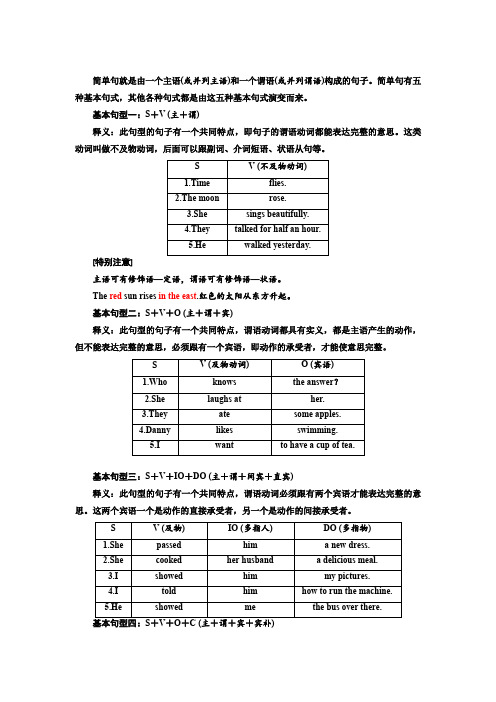
简单句就是由一个主语(或并列主语)和一个谓语(或并列谓语)构成的句子。
简单句有五种基本句式,其他各种句式都是由这五种基本句式演变而来。
基本句型一:S+V (主+谓)释义:此句型的句子有一个共同特点,即句子的谓语动词都能表达完整的意思。
这类动词叫做不及物动词,后面可以跟副词、介词短语、状语从句等。
[特别注意]主语可有修饰语—定语,谓语可有修饰语—状语。
The red sun rises in the east.红色的太阳从东方升起。
基本句型二:S+V+O (主+谓+宾)释义:此句型的句子有一个共同特点,谓语动词都具有实义,都是主语产生的动作,但不能表达完整的意思,必须跟有一个宾语,即动作的承受者,才能使意思完整。
基本句型三:S+V+IO+DO (主+谓+间宾+直宾)释义:此句型的句子有一个共同特点,谓语动词必须跟有两个宾语才能表达完整的意思。
这两个宾语一个是动作的直接承受者,另一个是动作的间接承受者。
释义:此句型的句子有一个共同特点,动词虽然是及物动词,但是只跟一个宾语还不能表达完整的意思,必须加上一个补充成分来补足宾语,才能使意思完整。
基本句型五:S +V +P (主+系+表)释义:此句型的句子有一个共同特点,句子谓语动词都不能表达一个完整的意思,必须加上一个表明主语身份或状态的表语构成复合谓语,才能表达完整的意思。
[知识拓展] 6类系动词(1)状态系动词,用来表示主语状态,只有be (am, is, are, was, were)一词。
(2)持续系动词,用来表示主语继续或保持一种状况或态度,主要有keep, remain, stay, lie, stand 。
(3)表象系动词,用来表示“看起来像”这一概念,主要有seem, appear, look 。
(4)感官系动词,主要有feel, smell, sound, taste 。
(5)变化系动词,表示主语变成什么样,主要有become, grow, turn, fall, get, go, come 。
高中写作句型练习-简单句,并列句,复合句

简单句:英语的五大基本句型!一、基本句型汉译英练习主谓结构说明:本结构是由主语加不及物的谓语动词构成, 常用来表示主语的动作。
如,The sun rises.主语可有修饰语---定语,如,The red sun rises.谓语可有修饰语---状语,如,The red sun rises in the east.翻译练习:1.你应当努力学习。
2.她昨天回家很晚。
3.那天早上我们谈了很多。
4.会议将持续两个小时。
5.在过去的十年里,我的家乡已经发生了巨大的变化。
6.这种事情全世界各地每天都在发生。
7.1919年,在北京爆发了“五.四”运动。
8.每天八时开始上课。
9.这个盒子重五公斤。
10.五年前我住在北京。
11.爱丽丝很会游泳。
12.约翰的父亲昨晚去世了。
13.秋天有些鸟飞到南方去。
14.我的爷爷早晨起得很早。
15.每天下午有许多学生到图书馆来借书。
二.Subject (主语) +Link. V(系动词) +Predicate(表语)此句型的句子有一个共同的特点:句子谓语动词都不能表达一个完整的意思,必须加上一个表明主语身份或状态的表语,才能表达完整的意思。
系动词主要包括:A)be动词。
如am,is are,was,were.如:He is clever.She is a beautiful girl.B)除了be 系动词外,还有一些动词也可以用作系动词,1)表感官的动词。
如:feel, smell, taste, sound, look等。
如:This kind of cloth feels soft.That flower smells good.The food tastes delicious.That piece of music sounds beautiful.He looks ill today.2)表变化和结果的动词。
如:become, get, grow, turn, go, come, prove等。
英语专业四级翻译句子结构
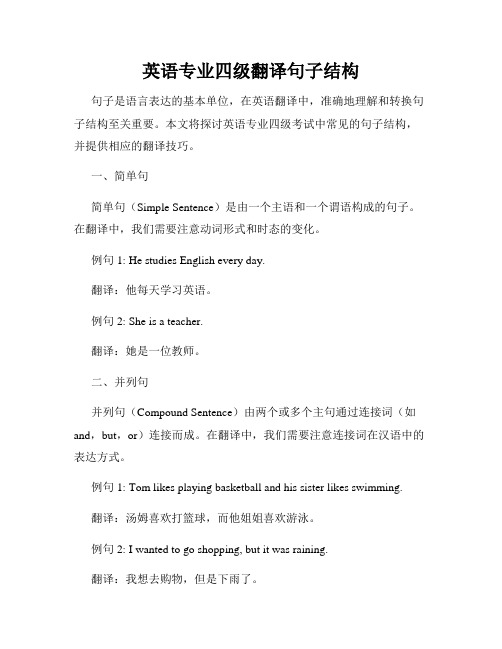
英语专业四级翻译句子结构句子是语言表达的基本单位,在英语翻译中,准确地理解和转换句子结构至关重要。
本文将探讨英语专业四级考试中常见的句子结构,并提供相应的翻译技巧。
一、简单句简单句(Simple Sentence)是由一个主语和一个谓语构成的句子。
在翻译中,我们需要注意动词形式和时态的变化。
例句1: He studies English every day.翻译:他每天学习英语。
例句2: She is a teacher.翻译:她是一位教师。
二、并列句并列句(Compound Sentence)由两个或多个主句通过连接词(如and,but,or)连接而成。
在翻译中,我们需要注意连接词在汉语中的表达方式。
例句1: Tom likes playing basketball and his sister likes swimming.翻译:汤姆喜欢打篮球,而他姐姐喜欢游泳。
例句2: I wanted to go shopping, but it was raining.翻译:我想去购物,但是下雨了。
三、复合句复合句(Complex Sentence)是包含一个主句和一个或多个从句的句子。
从句可以是名词从句、形容词从句或者副词从句。
在翻译中,我们需要根据从句的类型选择合适的翻译方法。
1. 名词从句名词从句(Noun Clause)在句子中担任名词的成分。
常见的引导词有that,whether和疑问词(如who,what,when,where,why)。
例句1: She asked if I could help her.翻译:她问我能否帮助她。
例句2: I don't know where he went.翻译:我不知道他去哪里了。
2. 形容词从句形容词从句(Adjective Clause)在句子中担任形容词的成分,修饰名词或代词。
常见的引导词有that,which,who,whom,whose。
初中英语并列句翻译练习题

初中英语并列句翻译练习题练习一:原句:Tom is reading a book, and he is also listening to music.翻译:汤姆正在读一本书,同时他也在听音乐。
练习二:原句:The weather is sunny, but the wind is strong.翻译:天气晴朗,但是风很大。
练习三:原句:She likes to play basketball, and she is good at it.翻译:她喜欢打篮球,并且她很擅长。
练习四:原句:He went to the store, but he forgot to buy milk.翻译:他去了商店,但是他忘记买牛奶了。
练习五:原句:We can either go to the park or stay at home.翻译:我们既可以去公园也可以待在家里。
练习六:原句:I finished my homework, and then I went to the library. 翻译:我完成了作业,然后我去了图书馆。
练习七:原句:They are not only students, but also volunteers.翻译:他们不仅是学生,还是志愿者。
练习八:原句:She will study abroad next year, but she is still unsure about the destination.翻译:她明年将去国外学习,但她仍然不确定目的地。
练习九:原句:The movie was interesting, yet it was too long.翻译:这部电影很有趣,但是太长了。
练习十:原句:He can play the piano, and his sister can play the violin.翻译:他会弹钢琴,他的妹妹会拉小提琴。
请同学们认真完成这些练习,并列句在英语中是非常常见的句型,掌握它们有助于提高英语写作和口语表达的能力。
初中简单句和并列句专练

㈠简单句和并列句考点揭密(一)简单句由一个主语(或并列主语)和一个谓语(或并列谓语)所构成的句子叫简单句,其结构是主语+ 谓语。
(二)并列句由并列连词把两个或两个以上的互相关连而又互相独立的独句(即简单句)连在一起而构成的句子叫并列句。
其结构是:简单句+并列连词+简单句常用的连词有and,but,or not only...but also,neither...nor,either...or中考考点设置(一)简单句1.主语、谓语在人称与数上的一致性。
and连接两个并列主语时为复数,谓语动词也相应地使用复数形式,但:(1)如果and连接的两个名词是不可数名词且前面都没有冠词,若两个词表示一个事物或一个概念,谓语动词要用单数;如果两个词表示的是两个事物或两个概念,谓语动词则要用复数。
(2)如果and连接的是两个可数单数名词,前一个有冠词,后一个没有冠词,意味着一个人或事物,谓语动词要用单数。
(3)当and连接的两个名词前都有each,every,many a,no等单数概念的限定词修饰时(第二个名词前的修饰词有时可以省略),谓语动词要用单数。
2.陈述句与疑问句的转换。
3.选择疑问句。
4.反意疑问句。
(1)陈述句+省略问句(2)祈使句+附加疑问句(3)反意疑问句的回答(二)并列句(1)并列连词的选用。
(2)并列连词与从属连词的区别。
典型例题解析【例1】John likes walking in the open air, .(2001,吉林) A.so does Tom B.also does TomC.tom likes alsoD.so Tom does【例2】Joke broke his leg,_________?[2001,南京]A.did heB.didn't heC.do youD.don't you【例3】There will be a volleyball match in our school, ? [2002,福州]A.be thereB.is thereC.will thereD.won't there【例4】Neither he nor I_________from Canada.We are from Australia.[2002,山西]A.isB.areC.amD.be【例5】There is a lot of_________in the box2002,吉林]A.cake B.bags of cakes k D.bags of milk (答案:ABDCC)课时训练1.We can't live_________water.A.withB.hasC.haven'tD.without2.We must hurry,_______we will be late for school.A.andB.orC.butD.if3._________you_________she are like English.A.Both...andB.Neither...norC.Either...orD.Not only...but also4.The number of the students_________50.A.areB.amC.isD.have5.He was tired,_________he still went on working.A.andB.butC.orD.also6._________Lily_________Lucy can go with you. Because one of them must look after their mother at home.A.Neither...norB.Either...orC.Both...andD.No tonly...but also7.Will you go and get some more_________for the teacher?A.chalksB.piece of chalkC.pieces of chalkD.pieces of chalks8._________is made of _________.A.Glasses,glassesB.A glass,glassC.Glasses,glassesD.A glass,glasses9.We are very tired,we should have_________rest.A.half an hourB.an hourC.half a hour'sD.an hour's10.I heard her_________in the next room.A.singingB.sangC.go singD.sing11.—I usually have breakfast at home.—_________.A.So have IB.So do IC.I have soD.I do so12.Open the door,_________?A.will youB.won't youC.don't youD.do you13.Sheep live on grass,_________?A.doesn't itB.don't theyC.does itD.do they14.He found_________interesting to learn English.A.itB.thisC.thatD.those15.Why_________the information on the Internet.A.not searchB.searchC.don't searchD.do search16.—You usually play football after school,don't you?—_________.But today I want to read English.A.Yes,I doB.No,I don'tC.No,I don'tD.No,I do17._________good weather it is today!A.HowB.How aC.WhatD.What a18.—He hasn't finished the work yet,has he?—_________.He finished it yesterday.A.Yes,he hasB.No,he hasn'tC.Yes,he hasn'tD.No,he has19.I didn't finish my homework yesterday.He didn'tfinish his homework,_________.A.tooB.alsoC.eitherD.well20.—Let's talk about the picture,_________?A.will youB.won't youC.shall weD.shan't we21.—It's a beautiful day.—_________.A.so is itB.so it isC.so does itD.so it does22.There is going to _________a sports meeting next week.A.haveB.hasC.holdD.be23._________exciting the news is !A.WhatB.What anC.HowD.How an24.The weather in Beijing is worse than ______ in Nanjing.A.thatB.thoseC.itD.this25._________TV is my mother's hobby.A.WatchB.WatchingC.SeeingD.See(答案:DBACB,BCAAA,BBBAA,AAACC,BDCAB,)Ⅱ句型转换1.The mountain is very beautiful.(改为感叹句)______ ____beautiful mountain it is!2.How is the weather in China?(改为同义句)______the weather ______in China.3.The boy is the most careless in his class.(改为同义句)The boy is ______ ______than _________boy in his class.4.He didn't watch TV,his mother didn't either.(改为同义句)_________he ______his mother watched TV.5.I spent the whole afternoon learning English.(同上)I spent ______ _______ ________learning English.6.I spent 100 yuan on the coat.(同上)I _____100 yuan _____the coat.I ______100 yuan ________the coat.The coat _______me 100 yuan.7.He has worked in this school since 2 years ago.(对划线部分提问)_______ _______has he worked in this school.8.He joined the aray 3 months ago.(改为同义句)____ ____3 months since he joined the aray.3 months ______ _______since he joined the aray.He _____ ______ _______the aray for 3 months.9.The visitors had a good time in Beijing.(同上)The visitors ________ ___________in Beijing.10.He will come back in a week.(对划线部分提问)_______ _______will he come back?11.He has never been abroad.(改为反意疑问句)He has never been abroad,_____ _____?12.Don't go alone.(改为反意疑问句)Don't go alone,_____ _____?13.There is little meat in the fridge.(改为反意疑问句)There is little meat in the fridge,_____ _______?14.Why not ask the man over there?______ ______ ______ask the man over there?15.How many people are there in India?_______ _____ __________of India?答案:1What a,2What's / like,3more careless /any other,4Neither /nor,5all the afternoon,6 paid/ for,spent/buying ,cost 7How long8It is/has passes/has been in9enjoyed themselves 10 How soon 11has he12will you13isn't there14Why don't you15What's the population1. I hope that I will hear from you soon.I hope ______ ______ from you soon.2. I wonder how I can go there.I wonder ______ ______go there.3. When and where they should build a new power station is a difficult problem for them. When and where ______ ______ a new power station is a difficult problem for them.4. The teacher who is wearing glasses teaches us English.The teacher ______ glasses teaches us English.5. My father got up early so that he could catch the first bus.My father got up early ______ ______ ______ catch the first bus.6. The girl is so short that she cannot be a model.The girl is ______ short ______ be a model.7. Do you mind if I smoke here ?Do you mind ______ ______ here ?8. The girl who is dancing on the stage is my sister.The girl ______ on the stage is my sister.9. I think it important that middle school students should learn English.I think it ______ ______ middle school students ______ learn English.10. I feel that it is dangerous to play with fire.I feel ______ ______ to play with fire.11. Marx found that it was necessary to study Russia.Marx found______ ______ ______ study Russia.12. After his father died, he left his home town.He left his home town after the ______ ______his father.13. Don’t forget to turn off the gas before you leave the kitchen.Don’t forget to turn off the gas ______ ______ the kitchen.15. She won’t go to see the play because she has lost her ticket.She won’t go to see the play ______ ______losing her ticket.16. She went for a walk after she had supper.She went for a walk ______ ______.17. I could swim when I was eight years old.I could swim______ ______ ______ of eight.18. He was late for school because it rained heavily.He was late for school ______ ______ the ______ rain.19. I don’t know how I can answer the question.I don’t know ______ ______ ______ the question.20. Please tell me what I should do first.Please tell me ______ ______ ______ first.21. He is so young that he can’t join the army.He is ______ ______ ______ join the army.22. She works so hard that she can pass the exam.She works ______ ______ to pass the exam.23. If you use y our head, you’ll find a way.______ your ______, ______ you’ll find a way.24. If you don’t work hard, you won’t pass the exam.______ ______, ______ you won’t pass the exam.25. The box is so heavy that we can’t carry it.The box is ______ ______ ______ us to carry.26. The problem is so easy that I can work it out.The problem is ______ ______ ______me ______ work out.27. I can’t pass the exam if you don’t help me.I can’t pass the exam ______your ______.28. I saw that he was playing computer games.I saw ______ ______ computer games.29. She heard that the boy cried all night.She heard the boy ______ all night.30. It seemed that he would catch up with others.He seemed ______ ______ up with others.将简单句改为复合句1. The problem is too difficult for us to work out.The problem is _______ ______ that we _______ work it out.2. Hurry up, or you’ll be late for the party._______ you _______ hurry up, you’ll be late for the party.3. The tree is too tall for us to reach .The tree is _______tall _______ we can’t reach_______ .4. The teacher asked us to come earlier.The teacher asked us ______ ______ ______ come earlier.5. The doctor put down the telephone , and hurried to Jim’s home.______ the doctor put down the telephone, he went to Jim’s home as ______ as possible.6. Don’t play basketball here, or you may break the window.______ ______ play basketball here, you may break the window.7. He came late because of the bad traffic.He came late ______ the traffic was ______ .8. He built a lab at the age of nine.He built a lab ______ ______ ______ nine.9. I can’t finish the work in time without your help .I can’t finish the work if ______ ______ ______ me .10. The water was too dirty for us to drink.The water was ______dirty that we ______ drink ______.11. At the end of the meeting his bag was lost.He couldn’t find his bag ______the meeting ______over.12. The teacher told us to do the experiment.The teacher told us how ______ ______ ______ the experiment.13. Could you tell me how to get to the station?Could you tell me ______ ______ ______ get to the station?14. She likes pork a little, but she likes beef better.She ______ beef ______ ______ pork.15. Mike is the tallest student in his school.______ ______ in the school is taller than Mike。
用简单句复合句并列句写一篇英语自我介绍

用简单句复合句并列句写一篇英语自我介绍Hello, my name is Lily. 大家好,我叫莉莉。
I am a senior in high school and will be graduating soon. 我是高中的一名学生,即将毕业。
I always have a positive attitude towards life and enjoy trying new things. 我对生活总是充满积极的态度,喜欢尝试新事物。
One of my hobbies is playing the piano. 我的爱好之一是弹钢琴。
I started playing when I was young and have continued to improve my skills over the years. 我从小就开始弹琴,并在这些年里不断地提高自己的技能。
Music is a big part of my life and has helped me through both good and bad times. 音乐在我的生活中占据着很大的比例,它在我生命中的好坏时期都给了我极大的帮助。
I also enjoy reading books in my free time. 我在空闲时间也喜欢阅读书籍。
Books have the power to transport me to different worlds and help me relax. 书籍有能力带我到不同的世界,帮我放松。
In the future, I hope to travel and explore new cultures and languages. 在将来,我希望能够旅行,探索新的文化和语言。
I believe that experiencing new things broadens our perspective and helps us grow as individuals. 我相信体验新事物可以拓宽我们的视野,帮助我们个人成长。
简单句并列句的翻译练习
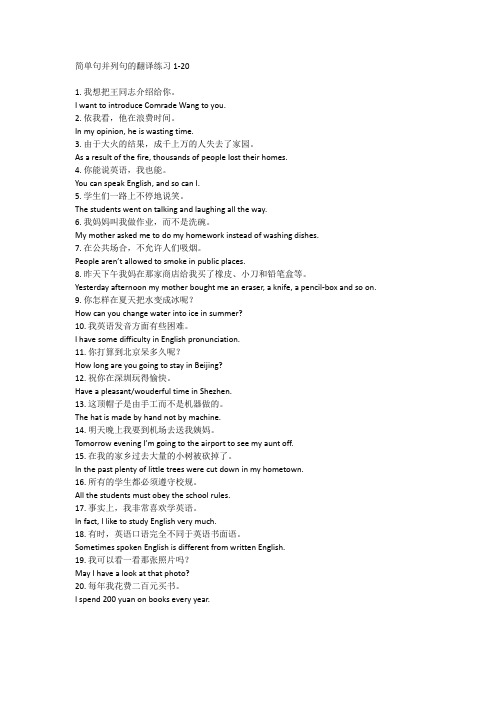
简单句并列句的翻译练习1-201. 我想把王同志介绍给你。
I want to introduce Comrade Wang to you.2. 依我看,他在浪费时间。
In my opinion, he is wasting time.3. 由于大火的结果,成千上万的人失去了家园。
As a result of the fire, thousands of people lost their homes.4. 你能说英语,我也能。
You can speak English, and so can I.5. 学生们一路上不停地说笑。
The students went on talking and laughing all the way.6. 我妈妈叫我做作业,而不是洗碗。
My mother asked me to do my homework instead of washing dishes.7. 在公共场合,不允许人们吸烟。
People aren’t allowed to smoke in public places.8. 昨天下午我妈在那家商店给我买了橡皮、小刀和铅笔盒等。
Yesterday afternoon my mother bought me an eraser, a knife, a pencil-box and so on.9. 你怎样在夏天把水变成冰呢?How can you change water into ice in summer?10. 我英语发音方面有些困难。
I have some difficulty in English pronunciation.11. 你打算到北京呆多久呢?How long are you going to stay in Beijing?12. 祝你在深圳玩得愉快。
Have a pleasant/wouderful time in Shezhen.13. 这顶帽子是由手工而不是机器做的。
简单句、并列句和复合句

简单句、并列句和复合句句子按结构可分为简单句、并列句和复合句。
复合句中包含宾语从句、状语从句或定语从句等。
◆一简单句简单句就是只包含一个主谓结构的句子,其句式结构主要有五种:①主 + 谓。
He works in a big company. 他在一家大公司工作。
②主 + 系 + 表。
She is a kind girl. 她是一个善良的女孩。
③主 + 谓 + 宾。
Ann eats junk food twice a week .安一周吃两次垃圾食品。
④主 + 谓 + 间宾 + 直宾。
He gave me a pen .他给我一支钢笔。
⑤主 + 谓 + 宾 + 宾补。
He kept me waiting for two hours .他让我等了两小时。
◆二并列句并列句由两个或两个以上的简单句连接而成。
并列句中的各简单句同等重要,没有从属关系,是并列的关系,之间用并列连词连接。
1. 表示顺承的并列连词有and / not only …but (also)等。
如:She not only gaveus a lot of advice, butalso helped us to overcome difficulties .他不仅给了我们很多建议,而且还帮助我们克服困难。
2. 表示选择的并列连词有or,either …or …等。
如:Either you or Maria will haveto go .你或玛丽亚得去一趟。
3. 表示转折的并列连词有but,yet,however 等。
如:It is hot in summer here , butit’s not cold in winter .这里夏天热,但冬天不冷。
4. 表示因果关系的并列连词有so,如:He works hard , so he is one of the topstudents in our class .因为他学习努力,所以他是我们班最优秀的学生之一。
简单句、并列句、复合句
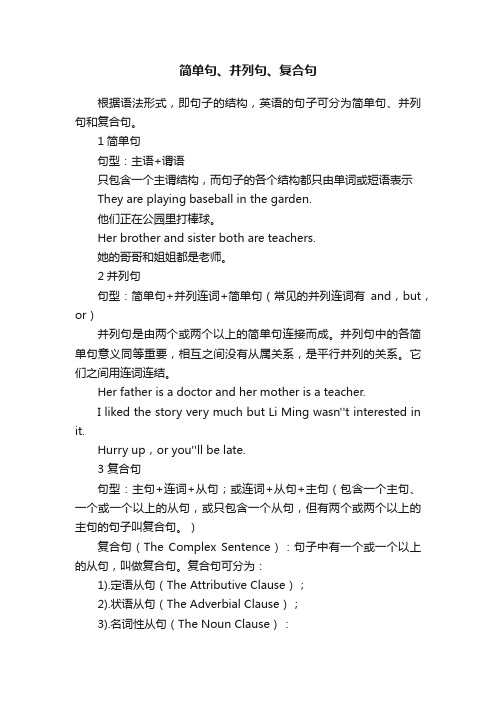
简单句、并列句、复合句根据语法形式,即句子的结构,英语的句子可分为简单句、并列句和复合句。
1简单句句型:主语+谓语只包含一个主谓结构,而句子的各个结构都只由单词或短语表示They are playing baseball in the garden.他们正在公园里打棒球。
Her brother and sister both are teachers.她的哥哥和姐姐都是老师。
2并列句句型:简单句+并列连词+简单句(常见的并列连词有and,but,or)并列句是由两个或两个以上的简单句连接而成。
并列句中的各简单句意义同等重要,相互之间没有从属关系,是平行并列的关系。
它们之间用连词连结。
Her father is a doctor and her mother is a teacher.I liked the story very much but Li Ming wasn''t interested in it.Hurry up,or you''ll be late.3 复合句句型:主句+连词+从句;或连词+从句+主句(包含一个主句、一个或一个以上的从句,或只包含一个从句,但有两个或两个以上的主句的句子叫复合句。
)复合句(The Complex Sentence):句子中有一个或一个以上的从句,叫做复合句。
复合句可分为:1).定语从句(The Attributive Clause);2).状语从句(The Adverbial Clause);3).名词性从句(The Noun Clause):一、定语从句定语从句的定义定语从句在句子中作定语,用来修饰一个名词、名词词组或者代词。
先行词和引导词被修饰的名词、名词词组或代词叫做先行词;在先行词和定语从句之间起连接作用的词叫做引导词。
引导词分为“关系代词”和“关系副词”。
关系代词和关系副词关系代词有:who, whom, whose, that, which, as。
英语并列句例句带翻译
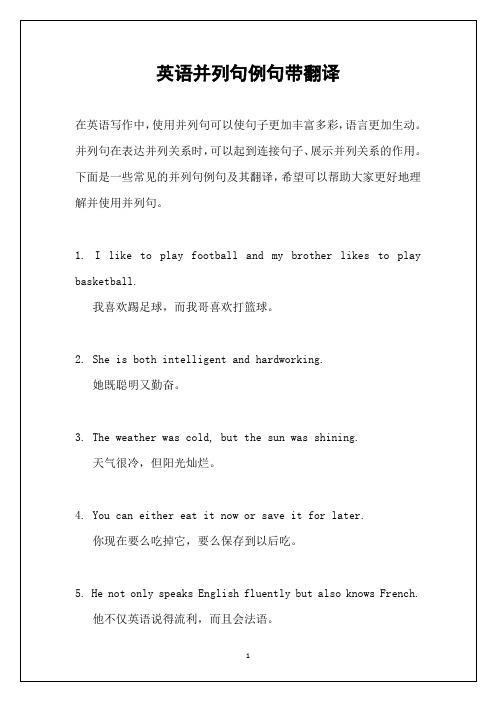
11. She not only sang beautifully but also danced gracefully.
她不但唱得优美,而且跳得优雅。
12. I want to travel to Europe, or maybe Asia.
我想去欧洲旅行,或者去亚洲。
以上是一些常见的并列句例句及其翻译。在写作中,合理运用并列句可以使文章更加丰富多彩,增加语言的表现力。希望以上例句可以帮助大家更好地掌握并列句的用法,丰富自己的英语表达方式。
汤姆喜欢去游泳,而他妹妹更喜欢呆在家里。
8. He is tall, dark, and handsome.
他又高又黑,很英俊。
9. You can go to the zoo or visit the museum.
你可以去动物园,也可以去博物馆。
10. The book was both interesting and informative.
我喜欢踢足球,而我哥喜欢打篮球。
2. She is both intelligent and hardworking.
她既聪明又勤奋。
3. The weather was cold, but the sun was shining.
天气很冷,但阳光灿烂。
4. You can either eat it now or save it for later.
英语并列句例句带翻译
在英语写作中,使用并列句可以使句子更加丰富多彩,语言更加生动。并列句在表达并列关系时,可以起到连接句子、展示并列关系的作用。下面是一些常见的并列句例句及其翻译,希望可以帮助大家更好地理解并使用并列句。
1. I like to play football and my brother likes to play basketball.
中考英语简单句并列句复合句考点讲解及练习

简单句、并列句和复合句考点一简单句1.简单句只包含一个主谓结构.2.五种简单句:1)主+谓. He comes at last.2)主+系+表. She is a teacher.The soup tastes nice.3)主+谓+宾. They reached the village.4)主+谓+间宾+直宾. He gave me a pen.5)主+谓+宾+宾补. I find that book very useful.考点二并列句并列句:两个或两个以上的简单句,用连词连接起来;常用的连接词有:1.表示顺承关系的:and, not only…but also不仅….而且….等;She ______ gave us a lot of advice, _______ helped us to overcome difficulties.Linda tried to become an excellent teacher, _____ at last she succeeded.2.表示选择关系和否定条件的有or还是,否则Do you want to leave now ____ would you rather set off laterWear your coat, ____ you’ll catch a cold.3.表示转折关系的有but, yet等;He is young, but he works hard.虽然他年轻,但工作努力;4.表示因果关系的有for, so 等;My leg hurts so I go to see a doctor. 我的腿疼,因此我去看医生;考点三主从复合句:宾语从句1.宾语从句的引导词1引导陈述句用 that在口语和非正式文体中常常省略He tells me that he is going shopping this Sunday.2 引导一般疑问句用if或whether.She asked me if\ whether she could join us. whether…or not3 引导特殊疑问句,要用原来的特殊疑问词;She asked them what they were doing.2.宾语从句的语序:要用陈述句语序;I want to know when the train left.3. 宾语从句的时态1主句是一般现在时,一般将来时或祈使句,宾语从句可根据实际需要选用各种时态;He tells us that he has been able to look after himself.(2)主句是过去时态,宾语从句应使用过去时的相应时态;They said that they had already finished the work.(3)如果宾语从句叙述的是客观事实、真理、自然现象等,不管主句用什么时态,从句都用一般现在时;He said that light travels faster than sound.3. 练习1She asked me, “Will you go to the cinema tomorrow”改为含宾语从句的复合句She asked me______ I ______ go to the cinema the next day.2 How lovely the dog is Can you tell me _____A. where did you get itB. where will you get itC. where you got it3 --- Can you tell me _____ your parents at home--- I often wash clothes and sweep the floor.A.how will you helpB. how you helpC. how will you helpD. howdo you help4 When I was young, my grandfather told me that the sun ______ rise in the east.考点四状语从句一、状语从句在复合句中作状语,修饰主句中的动词、形容词、副词等;1.地点状语从句地点状语从句通常由 where 引导;Put all the things _____they were.A. whereB. whenC. whoseD. which2.时间状语从句主句用将来时,从句用一般现在时时间状语从句的引导词有when, before, after, until, as soon as, since, while, as 等She was cooking when someone knock at the door.What will you do after you finished your homework3.条件状语从句在条件状语从句中,常用的引导词有if, unless等;If it dosen’t rain, I” ll go fishing.They will have a picnic unless it rains next Sunday.4.原因状语从句原因状语从句常用的引导词有because, as, since既然等He didn’t come because he was ill.Since we are students, we should study hard.Because 和so 不能在一个句子中同时使用;5. 结果状语从句结果状语从句主要由so…that…, such…that…引导;It’s so hot that we want to go swimming.That’s such an interesting story that everybody likes it.So… that…与简单句之间的句型转换1)that后的句子是否定句,常用too…to进行转换;He is so young that he can’t go to school. he is too young to go to school.2)that后的句子是肯定句;常用enough to 进行转换;The shirt was so cheap that he bought it. the shirt was cheap enough for him to buy.6.目的状语从句目的状语从句常用的引导词有so that, in order that 等 in order to 简单句Please say it in a loud voice so that everyone can hear it.He works harder in order that he can go to a good college.7. 让步状语从句引导词有though, although, even if, even though尽管等;He often helps others though\ although he is not rich.They will stand by you even if you don’t succeed.Though, although与but 不能同时出现在一个句子中8.比较状语从句比较状语从句由than, as…as…, not as\so… as等引导;比较级He is more outgoing than I.He ran as fast as Mike.二、练习1. It’s quite common in Britain to say “thank you”to the drivers _____ people get off the bus.a. afterb. sincec. untild. when2. The art club is for members only. You can’t go in ____you are a member.a. unlessb. becausec. ifd. though3. Now many parents send their children to foreign countries, _____ they want them to get a better education.a. untilb. thoughc. because4. ---- What would some students like to do after finishing their education---- They would like to start to work_______ they needn’t depend on their parents completely.a. as soon asb. so thatc. befored. while考点五定语从句修饰某一名词或代词的从句叫定语从句;被定语从句修饰的词叫先行词,引导定语从句的词叫关系词关系代词和关系副词;1.关系代词的基本用法The man __________spoke at the meeting is from Hong Kong. 指人作主语The building ___________is being built will be used as a hospital.指物作主语I visited a scientist _______ name is known all over the world. 指人作定语2. 关系代词特殊用法1当关系代词在从句中作主语时,从句的谓语动词要与先行词保持一致;He is one of the boys who ______ like playing football.He is the only one of the boys who________ like playing football.2 通常以下四种情况关系代词只能用that而不能用which.1 先行词为all, much, something, everything, nothing, little, none, the one 等不定代词时2先行词被形容词最高级修饰时;3当先行词被the only, the very, the just等修饰时;4先行词中既有人又有物时;3. 关系副词的基本用法;1 when 在句中作状语,表示时间;2 where 在句中作状语,表示地点;.3 why 在句中作状语,表示原因;He remembers the day _______ he joined the League.This is the reason_______ he is late today.This is the place _______ Lu Xun was born.1. 2011泰安--- _______do you read English newspapers---I read China Daily every day.A. How longB. How soonC. How oftenD. How far2.2011抚州John had a short walk after lunch, _______A. did heB. didn't heC. had heD. hadn't he3.2011宁波--- _______do you have an Art Festival in your school---Once a year.A. How longB. How oftenC. How farD. How soon4.2011安徽省If you want to go to see the movie this evening, so _______I.A. doB. amC. willD. should5.2011长沙 _______tall the girl isA. HowB. HowaC. WhatD. What a6.2011长沙 _______ call me Mimi It's my cat's name.A. NotB. Didn'tC. Doesn'tD. Don't7.2011长沙They went to the park yesterday,_______A. don't theyB. didn't theyC. aren't theyD. can't they8.2011福州---Li Mei usually helps others, _______---Yes, she is kind-hearted.A. does sheB. is sheC. doesn't she9.2011眉山There _______an English party in our school tomorrow evening.A. haveB. will haveC. is going to haveD. will be10. 2011济南--- _______a year does your school have sports meetings---Twice a year.A. How oftenB. How soonC. How longD. How many times11. 2011泰州---I have changed my job.---_______.A. So do IB. So have IC. So I doD. So I have12. 2011济南Mike learns a lot about Internet. And _______.A. I don't, eitherB. so do IC. so am I am, too13. 2011眉山Jim never goes to the movies on Saturday, _______A. does JimB. doesn't JimC. doesn't heD. does he14. 2011玉州You've just finished your listening exam Please getyourself ready for the next part, _______A. shall weB. will youC. do youD. are you15. 2011眉山--- _______the weather like last Monday---It was sunny.A. How wasB. What'sC. What wasD. How is16. 2011潍坊_______great scientist Qian Xuesen isA. HowB. HowaC. WhatD. What a17. 2011眉山--- _______do you visit your grandparents---Once a month.A. How soonB. How longC. How muchD. How often18. 2011内江--- _______ do you speak English so well---Because I practice it with my partner every day.A. WhyB. WhenC. Who19. 2011泉州---We'll go to Qing Yuan Mountain tomorrow. Why _______join us---That's a good idea.A. notB. don'tC. can'tD. didn't20. 2011泉州There is little milk in the glass, _______A. is thereB. isn't thereC. isn't itD. does it21. 2011肇庆The students in Class Two played basketball against ClassOne yesterday,_____A. did theyB. didn't theyC. weren't they22. 2011宁波---What a new computer Can you tell me_______---Just the day before yesterday.A. how much you paid for itB. how much did you pay for itC. when you bought itD. when did you buy it23. 2011泰安---Tom wants to know if you will have a picnic tomorrow.---Yes. But if it _______, we'll play chess instead.A. will rainB. rainedC. is rainingD. rains24. 2011烟台---Do you know this dictionary belongs to---Let me see. Oh, it's_______.A. who does; mineB. who; meC. whose; mineD. who; mine25. 2011杭州Franklin told them all _______to be in Britain again.A. he was how happyB. how happy he wasC. how was he happyD. he was happy how26. 2011湖州---What kind of movies do you like---I like the movies_______ are about Chinese history.A. whoB. whomC. whoseD. that27. 2011丽水---Do you know _______---Sorry, I don't have a watch.A. whose watch this isB. whose watch is thisC. what time it isD. what time is it28. 2011重庆The woman asked the policeman where _______.A. the post office isB. the post office wasC. is the post officeD. was the post office29. 2011泰安---Can you guess_______ the new schoolbag yesterday.----Sorry, I've no idea.A. how much did he pay forB. how much he spentC how much he paid for D. how much did he spend30. 2011杭州Who is the man_______ is reading a book over thereA. thatB. whichC. whoseD. what31. 2011湖州---Do you know_______---Next Sunday.A. what they will doB. where they will doC. when they will come hereD. who they will meet32. 2011长沙---Can you tell me why_______---Because I want to help the people there.A. do you go to Tibet西藏B. did you go to TibetC are you going to Tibet D. you are going to Tibet33. 2011浙江省---Linda, could you tell me _______---He is an actor.A. what he doesB. what does he doC where he works D. where does he work34. 2011福州---Could you tell me _______---Sure. The day after tomorrow.A. when will you leave for the U.S.A.B. when Mr. Lee will comeC when your father returned35. 2011济南He asked me_______.A. who did kick the first goal in the World CupB. when was the A. PEC meeting heldC when China became a member of the WTOD. where will the 2008 Olympics be held36. 2011玉州Jane is one of the students in the class _______ have everbeen to China.A. whoB. whoseC. whichD. whom37. 2011济宁Can you tell me _______after this examA. what you didB. what did you doC. what will you doD. what you will do38. 2011苏州---Can you tell me how many colours _______ in a rainbow---SevenA. there areB. are thereC. they areD. are they39. 2011潍坊I can't understand _______Apple's iPad 2.A. why are they so mad aboutB. why they are so mad aboutC. how are they so mad aboutD. how they are so mad a。
- 1、下载文档前请自行甄别文档内容的完整性,平台不提供额外的编辑、内容补充、找答案等附加服务。
- 2、"仅部分预览"的文档,不可在线预览部分如存在完整性等问题,可反馈申请退款(可完整预览的文档不适用该条件!)。
- 3、如文档侵犯您的权益,请联系客服反馈,我们会尽快为您处理(人工客服工作时间:9:00-18:30)。
五种句型:
1.历史在发展。
2.我们都呼吸、吃饭且喝水。
3.太阳从东方升起,西方落下。
4.孩子们是我们的快乐、希望和未来。
5.鱼在热天容易变坏。
6.他整天都保持沉默。
7.那个女孩看起来很高兴。
8.他知道一些法语和英语。
9.他喜欢玩篮球。
10.我不知道下一步要做什么。
11.我们能够学会新知识。
12.我们的老师给我么讲述了一个有趣的故事。
13.你愿意帮我一个忙吗?14.老师吧书给了那个小女孩。
15.他妈妈出示给我一些老照片。
16.请给我买两张电影票。
17.警察把钱包递给他的妹妹。
18.我想要把每件事在七点钟前准备好。
19.那个老板发现有人在教室里面读书。
20.他们看到火车离开了车站。
21.所有的学生都选汤姆做班长。
22.我们认为你的建议很有用。
巩固练习:
1.英国、美国和澳大利亚都是讲英语的国家。
2.最后,布朗和他的朋友互换了礼物。
3.他穿上衣服、起了床,走了出去。
4.火车已于下午三点钟时到了。
5.当时,电话铃声响了。
6.昨天晚上,我的胃疼。
7.很快,彩虹消失了。
8.今天上午,他在家里打碎了一个杯子。
9.中国拥有大量的煤和天然气。
10.在晚会上,我们过得很开心。
11.他喜欢读一些有趣的书。
12.他向我展示了一台新电脑。
13. 这个公司去年提供了我一份好工作。
14.你们应该支付我十美元。
15.他们叫我汤姆。
16.你最好保持这条狗在屋子外面。
17.农夫们必须保持土壤处于良好的状态。
18.我看到工人们正在车间里工作。
19.他提高了声音目的是使自己被别人听到。
20.他将找人修房子。
并列句四种关系:
1.铃声正在响,并且这节课结束了。
2.我正在工作,而我的同事在浏览网站。
3.多穿些衣服,否则你会感冒的。
4.昨天晚上一定下雨了,因为地面是湿的。
5.我的自行车坏了,因此我走着回家。
6.他谈得很少,但他想的很多。
7.Mary 喜欢音乐和舞蹈,并且她唱的非常好。
8.或者他来这,或者我去那。
9.我们已获得了胜利,但是我们还有很长的路要走。
10.他淋雨了,因此他感冒了。
11.我没有看过这部小说,我也不知道它的作者。
12.努力,你就能赶上其他人的。
13.下个月我要去上海,届时我要访问几个朋友。
14.不是你疯了,就是我疯了。
15.快点,否则我们会上学迟到了。
16.再多几分钟我会把任务完成得更好。
巩固练习:
1.我有几个好朋友,而且他们也是农民。
2.李明生病了,因此他没来。
3.他是一个善良的学生,而且他学习刻苦。
4.我不但看过这部电影,而且我还认识这部电影的导演。
5.他们既没有到过黑河,他们也没有听说过这个城市。
6.除非你早起,否则你赶不上火车。
7.昨天夜里,或者发生了火灾,或者一个重要的人物去世了。
8.你或者可以来这,或者我去拜访你。
9.你想休息一下还是立即开始工作。
10.早五分钟,你就能赶上那班火车了。
1. On Sunday afterno on, I always have a bath, ____ a children’s programme on TV and do some shopping. A. watched B. watching C. to watch D. watch
2. She got down to work after supper ____ the report two hours later.
A. finished
B. to finish
C. having finished
D. and finished
3. Would you like to have a rest ____ shall we get down to work at once?
A. and
B. then
C. or
D. because
4. My name is Robert, ____ most of my friends call me Bob for short.
A. then
B. instead
C. however
D. but
5.Also rail travel is very safe and I am never sick on a train ____ I am on a ship.
A. when
B. while
C. like
D. and
6. I was going to be late ____ the manager wasn’t going to be pleased.
A.as
B. but
C. and
D. or
7.T om took the first prize, ____ was a wonderful achievement for a small child.
A. and it
B. this
C. that
D. and which
8. We’re going to the bookstore in John’s car. Y ou can come with us ____ you can meet us there later. A. but B. and C. or D. then
9. They haven’t enough to eat, they ____ in dirty surroundings, and diseases are common.
A. living
B. to live
C. live
D. lived
10. John wanted to play basketball; ____, it was raining and he stayed at home.
A. however
B. or
C. and
D. but
11. Follow your doctor’s advice, ____ your cough will get worse.
A. or
B. and
C. then
D. so
12. Lose one hour in the morning ____ you will be looking for it the rest of the day.
A. but
B. and
C. or
D. so
13. ____st raight on and you’ll see a church. Y ou won’t miss it
A. Go
B. Going
C. If you go
D. When going
14. –English has large vocabulary, hasn’t it?
--Y es.___more words and expressions and you will find it easier to read and communicate.
A. Know
B. Knowing
C. T o know
D. Known
改错:
1. The cake tastes deliciously. Would you like to taste it?
2. My bag was disappeared suddenly. I was very worried.
3. It’s a wonderful place. I’d like to visit again very much.
4. I remember lending you the necklace, but you brought it back for me the next day.
5. Will you please change this ten-yuan note to me?
间接宾语在句中通常位于直接宾语之前,如果位于其后,间接宾语之前须加介词to表示动作对谁做,或者加for表示动作为谁做。
下列动词要用带for 间接宾语:
Prepare make order catch save chang buy\get cook find cut spare build fix do choose keep leave I bought her a book. = I bought a book for her. He gave me the newspaper. = He gave the newspaper to me.
我准备制作个定单---抓紧节省点钱买个厨师,这厨师发现他只能切菜不能抽空进行建筑安装,他要做出选择保留还是离开.。
